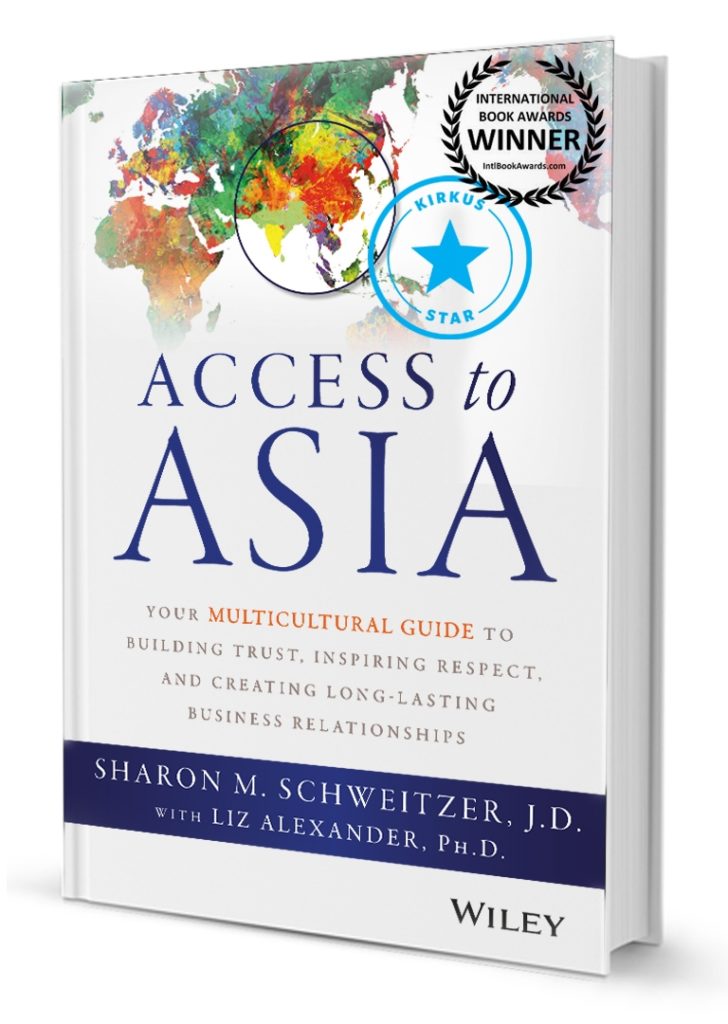A blue and white Texas porcelain tray is nestled beautifully among other cherished gifts on the office coffee table of Madam Nie Meisheng. She is the former Chairwoman of the Chinese Real Estate Chamber of Commerce in Beijing, China. When I gifted this eye-catching, artfully scalloped ‘made-in-Texas, USA’ tray, I intended it to be a special item for a place of honor. I am delighted that every visitor invited for tea has an opportunity to see that gorgeous Texas tray.
Building trust is a rewarding experience. When gift-giving occurs ethically and elegantly, it solidifies professional relationships and inspiring respect in global business ventures.
The art of gift giving in the U.S. and globally includes nuances that the unsophisticated overlook. Access to Asia, written by my co-author Liz Alexander, Ph.D. and me, has won a number of awards Access to Asia by Sharon Schweitzer & Dr. Liz Alexander | Access to Culture (protocolww.com) and provides a comprehensive guide to the cross-cultural implications of gift giving in Asia, as well as a practical framework of effective strategies for business leaders and managers.
As the first of several global gift-giving blogs, let’s explore appropriate and heartfelt gifts for your global business partners.
United States of America
- Appropriate business gifts include coffee table books, desk accessories, regional geographical guides, and office items.
- Inappropriate gifts include cash or cash equivalent gift cards, personal clothing, and hygiene-related products such as bath bombs, cologne, fragrance, or shaving items.
- To the extent possible, research allergies, health, spiritual beliefs, and preferences in advance before giving food, tree-nuts, sweets, or alcoholic drinks.
- Retail baskets of pre-packaged sweet or savory selections are popular. Examples include cheese, crackers, nuts, and cured meats. Baked goods, cookies, breads, and pastries.
- Buy, gift, and send moderately priced gifts to avoid an atmosphere of awkwardness.
- Gift recipients are encouraged to send a handwritten thank-you note within 48 hours.
East Asia
- Gifts are exchanged at first and subsequent meetings so be prepared. Both hands are used to give and receive gifts in China.
- Appropriate gifts include small office items such as bowls, pens, and decorative trays; women may gift cosmetics and silk scarves to other women. Inappropriate gifts include clocks, cranes, sharp objects, and handkerchiefs.
- Japan:
- Omiyage or gifts continue to be a crucial aspect of Japanese business culture.
- Appropriate gifts include regional gifts from your home country gift shops. Gift quality is important and reflects the value placed on your relationship.
- Avoid giving items with organizational logos, sharp-edged items such as knives or scissors, and gifts made in Japan.
- Be sure to have your gift professionally wrapped.
- Gifts are opened in private by Japanese counterparts. Unless the gift is to be shared by everyone, unwrap the gift privately.
- South Korea: Appropriate business gifts include a USB flash drive, high-quality pens, lanyards, desk accessories, and clocks.
- Avoid inappropriate gifts such as handkerchiefs, sharp-edged objects like scissors, knives or swords, red inks, and shoes.
- Professionally wrap the gift before presenting it to your Korean counterpart.
South Asia
- India: Appropriate gifts include high-quality pens or European chocolates. Inappropriate gifts are items easily bought in India, or gifts wrapped in black or white. Be cautious about giving liquor. Indians enjoy giving gifts, so do not be surprised if you receive a gift.
Southeast Asia
- Myanmar: Appropriate gifts include pens, golf balls, and liquor – especially whisky.
- Three Burmese occasions give rise to gift-giving: departure from employment, marriage, and the birth of a child.
- Burmese counterparts may decline gifts by saying “Please, you should not have gone to so much trouble.” Politely reply and insist that it is your honor to present the gift.
- Singapore: In Singapore, business-related gift giving is not a customary practice.
- If you are fortunate enough to be invited to someone’s residence, bring along a small gift. Research on culture specific customs of ethnicities in the Singapore region including Bumiputera, Chinese, and Indian to present the most appropriate gift.
Incorporate these intercultural guidelines with your Asian and U.S. American counterparts to foster strong relationships. For information about gift-giving and the diverse cultural implications in other regions, stay tuned for more posts in this gift-giving series.
Sharon Schweitzer, J.D., is a cross-cultural trainer, modern manners expert, and the founder of Access to Culture. In addition to her accreditation in intercultural management from the Hofstede Centre, she serves as a Chinese Ceremonial Dining Etiquette Specialist in the documentary series Confucius was a Foodie, on Nat Geo People. She is regularly quoted by BBC Capital, Investor’s Business Daily, Fortune, and other media. Her Amazon #1 Best Selling book in International Business, Access to Asia: Your Multicultural Business Guide, won a coveted Kirkus Star and was named to Kirkus Reviews’ Best Books. Her consultancy is a winner of the British Airways International Trade Award at the Greater Austin Business Awards.
#SharonSchweitzer, #AccesstoCulture, #Access2Culture, #GlobalGiftGiving, #AccesstoAsia, #Access2Asia, #Interculturalist, #CulturalIntelligence, #GlobalEtiquette, #Cross-CulturalTrainer, #InterculturalCommunication, #GlobalCommunication, #Etiquette, #CultureExpert, #Speaker, #KeynoteSpeaker, #Culture, #DEI, #Inclusion #GiftGiving


Leave A Comment